William Rees is an ultra-distinguished ecological scientist, and an original researcher on human impacts on biosphere life. Eric Lee has cleaned up, and published a formatted transcript with slides, taken from Prof. Rees recent webinar presentation titled - "Will Modern Civilization be the Death of Us? Have Humans Become Obsolete?".
The depths of our current human predicaments, and our collective inability to escape them, and watch ourselves helplessly as we dig our way in deeper, should be telling us that our combined systems of culture, technology beliefs and cognitive abilities have been outstripped by our circumstances. We can barely pull together to give this disturbing topic our best attentions. It is difficult for modern techno-industrial humans to accustom themselves to this proper use of language and we do really need to talk about our Overshoot. So let us try to understand better why William Rees wants to reach out to us, and give us from his life's work on this topic.
Transcript (Thanks to Eric Lee, for original, some small edits done here).
Speaker 1 0:11
Hi everyone. I am really looking forward to this evening’s webinar
as a follow up to last month’s webinar on similar topics, and it’s my great
pleasure to introduce Dr William Rees. William Rees is an ecologist,
an ecological economist, professor emeritus and former director of the
University of British Columbia, School of Community and Regional Planning.
He researches global ecological trends with special interests in cities as
vulnerable components of the human ecosystem and in psycho cognitive barriers
to societal change. Professor Rees is the originator and CO developer
with his graduate students of ecological footprint analysis EFA,
which you almost certainly have heard of. He’s authored hundreds
of peer reviewed and popular articles on EFA and the above topics.
He’s a fellow of Royal Society of Canada, and Professor Rees
is also a founding member and former president of the Canadian Society
for Ecological Economics, a founding director of the One Earth living initiative
and a fellow of the post carbon Institute. Professor Rees is a recipient
of the Trudeau Foundation Fellowship and both the international Boulding
Prize in Ecological Economics and a Blue Planet Prize, which he won
jointly with Dr Mathis Wackernagel. He also received the
2015 Herman Daly award from the US society of ecological economics,
and in 2016 a Dean’s Medal of distinction from UBC Faculty of Applied Science.
So he’s done a lot, and whatever he has to say, I am I’m all ears.
Professor Rees was a full member of the Club of Rome from 2014 to 2019
so very strong background in the topics that he’s going to present on today,
and going to ask him to start his video and then go ahead, Bill and take it away.
William Rees 2:13
Well,let me begin by thanking you very much for that introduction and
welcoming everyone to this particular presentation, which is just
something I’ve been pondering for the last, well, a couple of years,
really. And I don’t expect everyone to come along with me on this rump,
but it’s something that’s occupied a lot of my time, so I thought it was
worth sharing it a little bit.
So let’s get right into it. I’m going to begin by giving you a summary of
what I’ve got to say, in case you want to ponder it as we go along. The
major takeaways are this, that modern techno industrial humans us are
not cognitively equipped to deal with the global ecological crisis.
There are several reasons for this. First of all, people tend to think
in simplistic reductionist terms.
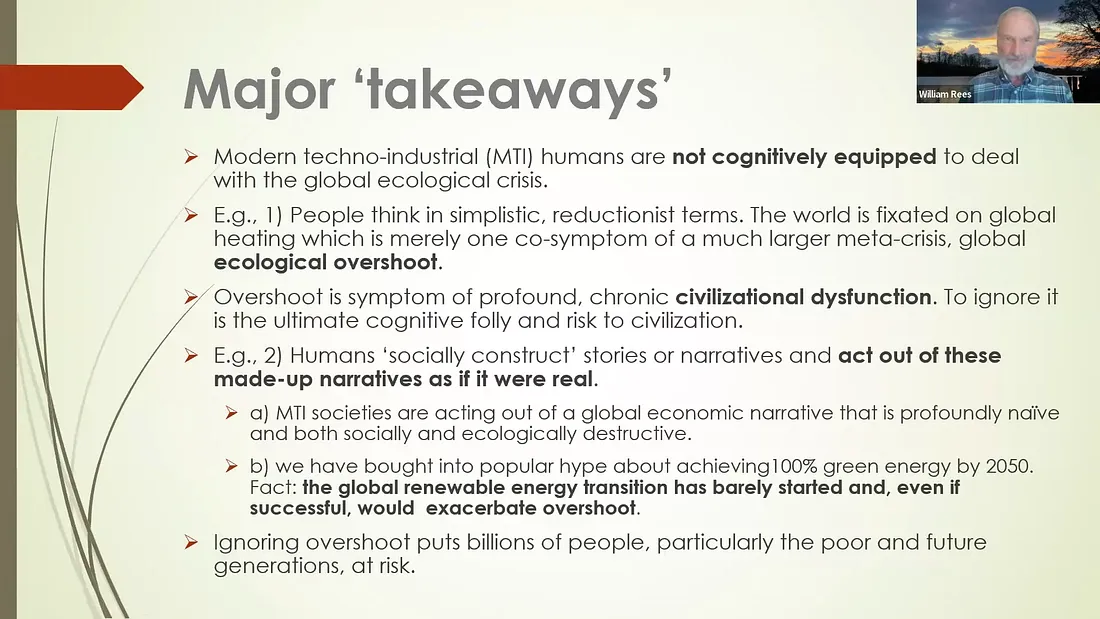
William Rees 3:05
For example, world is fixated on global heating or climate change, which is
just one symptom of a much larger meta crisis, the ecological overshoot.
Overshoot is a symptom of profound chronic civilizational dysfunction,
and to ignore it is the ultimate cognitive folly and a risk to civilization.
Another example, humans socially construct stories or narratives, and then we act out of those stories as if they were real. So for example, we are currently acting out of a global economic narrative that is profoundly naive and both socially and ecologically destructive.
Moreover, most of us have bought into popular hype about the existing or potential energy transition of achieving 100% green energy by 2050 and the facts are that the renewable energy transition has barely started, and even if successful, would merely exacerbate the real problem. And I’m really getting to the argument that if we keep ignoring the real problem, we put billions of people, particularly the poor and future generations, at risk.

William Rees 4:18
So what do I mean by obsolescence? Something becomes obsolete if a newer version of that thing comes along that is more efficient or otherwise functionally superior to the original. Something can also become obsolete if that entity’s operating environment changes so much that it is no longer able to function effectively and may even become self destructive.
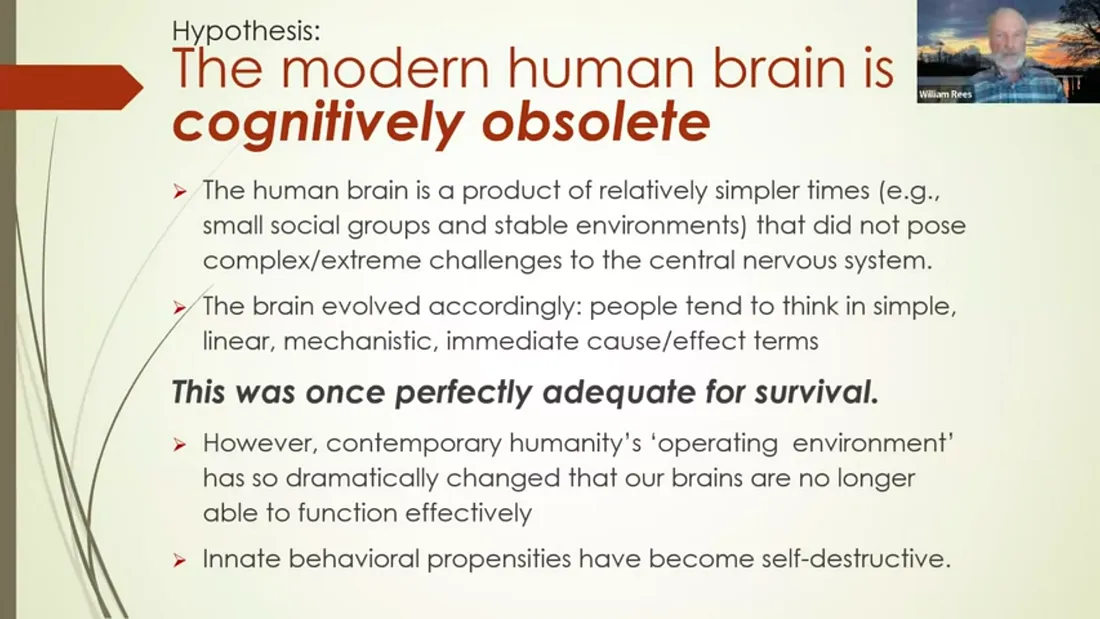
William Rees 4:42
And my basic argument is that human beings are in the second of these categories. The human brain is cognitively obsolete. It’s a product of a relatively simpler period in our evolutionary history, the Paleolithic, and that period did not pose complex or extreme challenges to the central nervous system, certainly nothing compared to what we’re confronting today. So our central nervous systems, our brains, evolved accordingly. We tend to think in simple, linear, mechanistic and immediate cause effect terms, and by the way, that was once perfectly adequate for survival. However, our contemporary operating environment has so dramatically changed that our brains are no longer able to function effectively.

William Rees 5:30
Innate behavioral propensities are on the brink of becoming self destructive. So what’s the evidence for this notion that we operate from simplistic reductionism? First of all, I think you all recognize that we tend to fixate on one major problem at a time, climate change, the Covid-19 pandemic, the Russian Ukraine war, so on and so forth. And then back to climate change, global heating remains the current primary shared preoccupation of the international community. However, climate change is but one co-symptom of a much greater ecological meta problem.
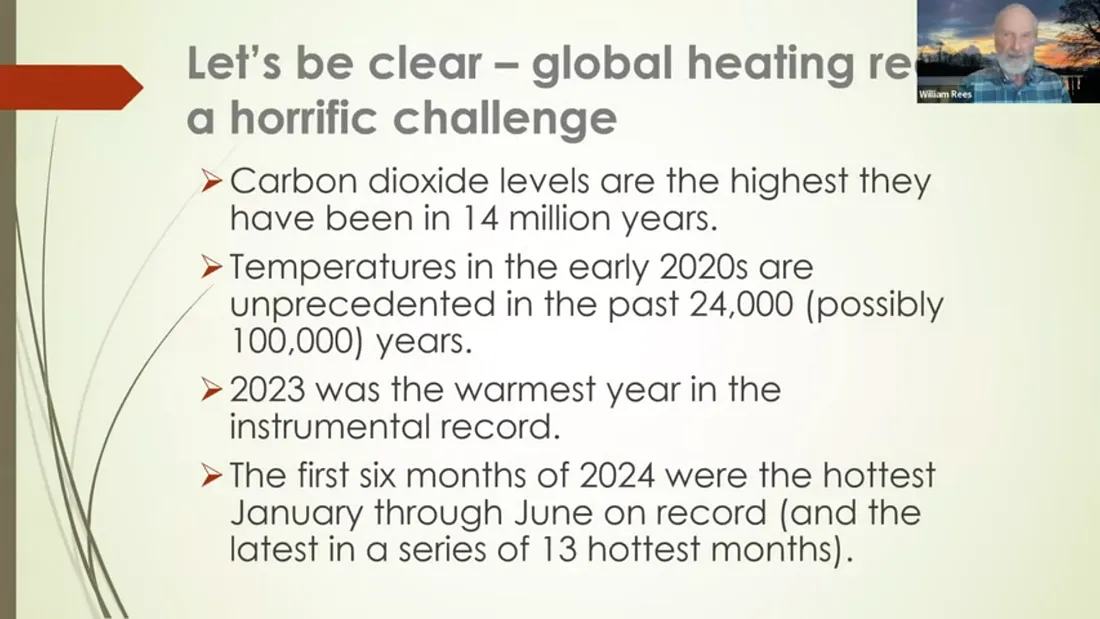
William Rees 6:12
Let’s be clear, I’m not suggesting for a moment that climate change isn’t an issue.
It’s an horrific challenge.
Carbon dioxide levels at the highest they’ve been in 14 million years.
Temperatures in the early 2020s are unprecedented in the past 24,000 years,
and perhaps even 100,000 years.
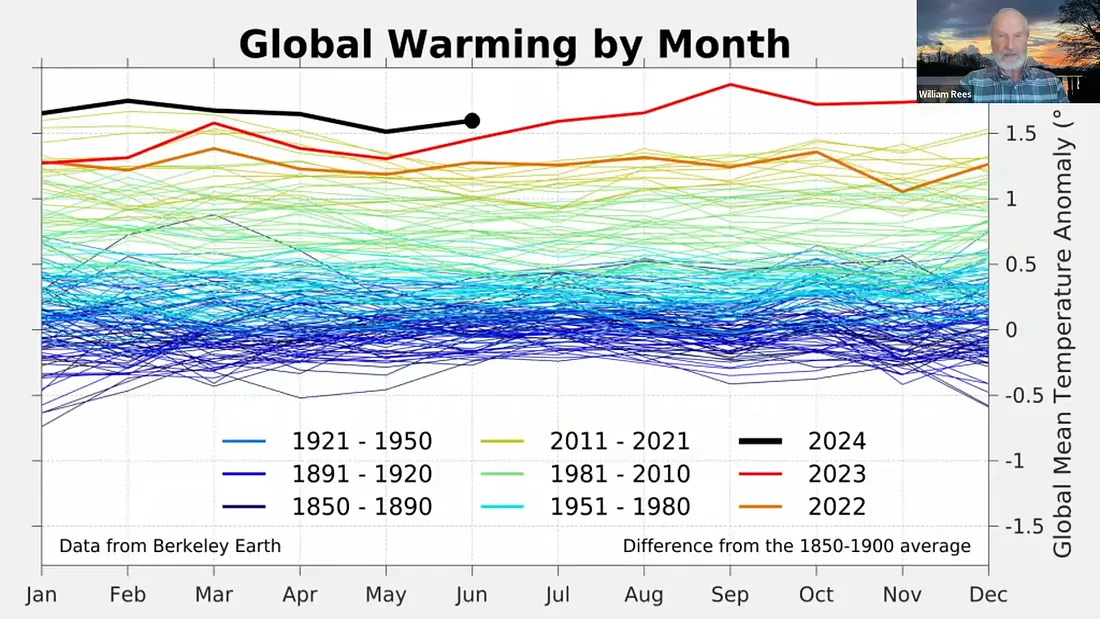
William Rees 6:31
Last
year was the warmest year in the instrumental record, and the first six
months of this year are the hottest January through June on record, and
the latest in a series of 13 hottest months. And we can see this
graphically, showing that almost every year recently, we go further and
further outside the limits of probability. So what are climate
scientists saying about our current circumstances?
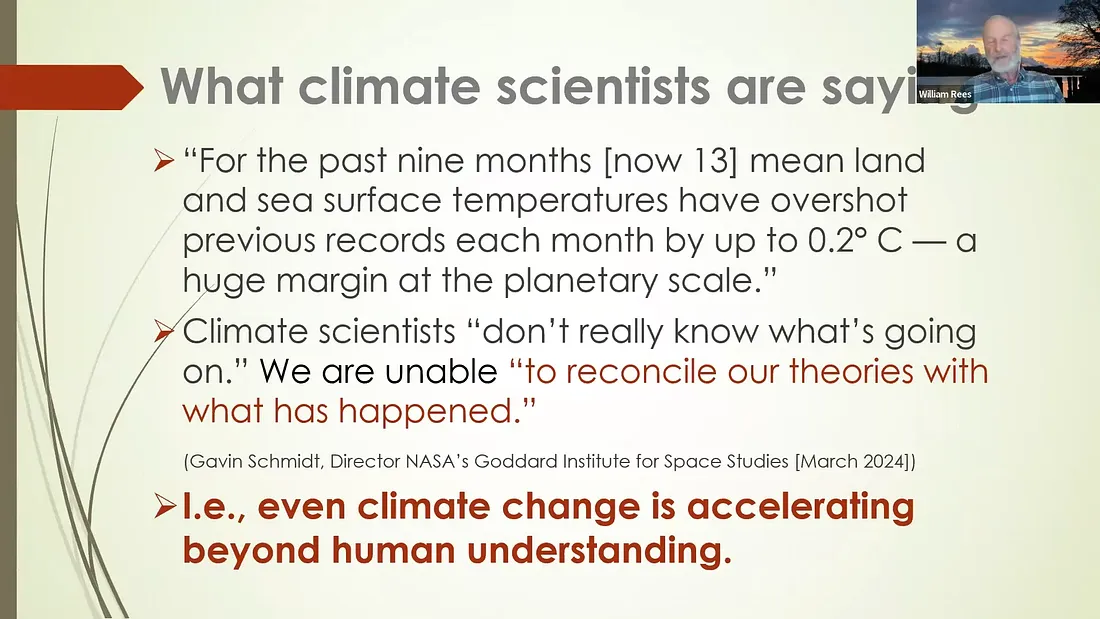
William Rees 6:58
These are direct quotes from Gavin Schmidt, who’s the probably the top US climate scientist right now, and the director of the Goddard Institute for Space Studies. For the past nine months, (and it’s now 13 months), mean land and surface sea temperatures have overshot previous records each month by up to 0.2 Celsius degrees.
This is a huge margin at the planetary scale, and this is really important. Climate scientists, quote, “don’t really know what’s going on.”, end quote. Again, we are unable, quote, “to reconcile our theories with what has happened.” Now, this really does illustrate what I’m getting at. Even climate change is accelerating beyond our most sophisticated human scientific understanding.
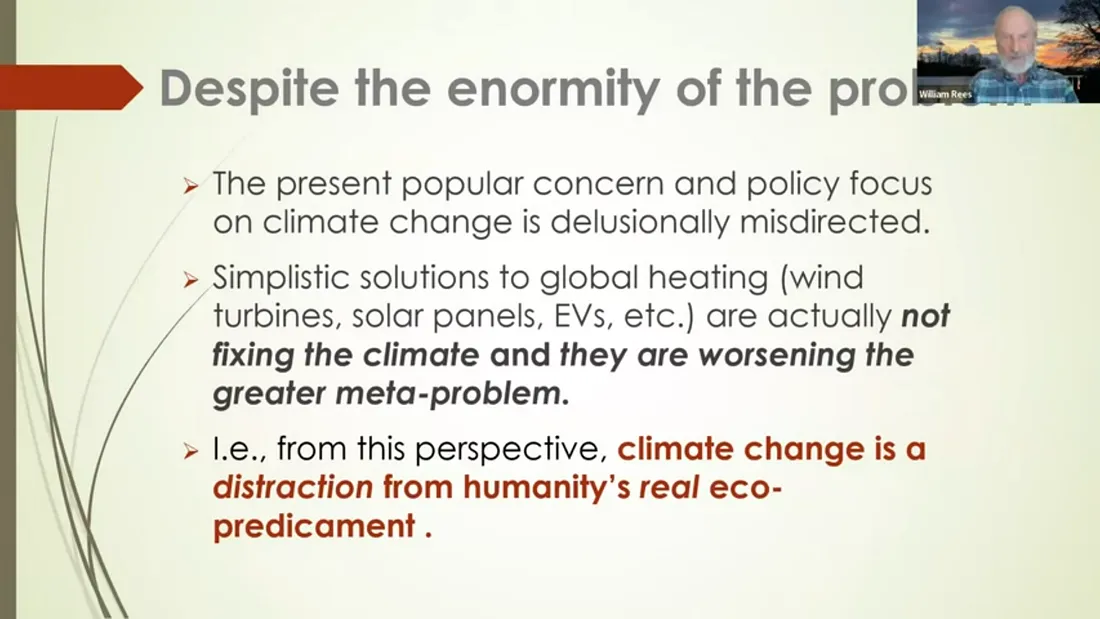
William Rees 7:50
We have become obsolete in the face of the rapidly changing environment we ourselves have created. So despite the enormity of the climate problem, the present popular concern and policy focus on it is delusionally misdirected. Simplistic solutions to global heating, such as wind turbines, solar panels, electric vehicles and so on, are actually not fixing the climate, and they are worsening the greater meta-problem, which is the cause of climate change.

William Rees 8:19
So from this perspective, climate change is a distraction in the real eco-predicament. We discussed the real eco-predicament four years ago, but I want to reiterate here, just so you know what I’m getting at, the real existential threat to humankind, at least from the ecological perspective, is called overshoot. This means that the human enterprise, the economy of all 8 billion of us is consuming, even self producing and replenishable resources, faster than they can regenerate.
William Rees 8:50
And we are producing wastes, which is often toxic and excessive of nature’s assimilative capacity. We’re literally consuming and polluting the biophysical basis of our own existence. And this, of course, is the essence of unsustainability. Virtually all so called environmental problems, plunging biodiversity, ocean acidification, tropical deforestation, desertification, more frequent pandemics, soil and landscape degradation, falling sperm counts, the pollution of everything, etc, etc. All of these things are co-symptoms of ecological overshoot, climate change included. And overshoot is the overriding disease. And overshoot, if you follow the definition, is a terminal condition. We can’t continue to consume beyond nature’s production. We’re drawing down the natural capital base upon which we all depend.

William Rees 9:44
So just what’s going on here? There’s many, many factors, and I’m just going to pick two, kind of overriding umbrellas, if you will, that begin to explain this. One of them is bio evolutionary. The fact is, times have changed. So in the 20th and 21st century, cultural evolution has vastly outstripped biological evolution. A cultural evolution primarily in the form of advanced technologies. So that we MTI peoples live in a mind numbingly complex, rapidly changing rule system of overlapping cultural and biophysical subsystems, any one of which is more complex than the entire environment of our Paleolithic ancestors. This modern techno-industrial (MTI) or techno cultural bioenvironment constantly challenges our limited cognitive capacities.
People today are not cognitively equipped to fully understand, let alone control, the workings of any major cultural subsystem. Who really understands the global economy or how the internet works, artificial intelligence, geopolitics, or their interactions with the climate system or any other biophysical subsystem of the ecosphere. We simply don’t get complexity.
We don’t think systematically. Even policy analysts often fail to connect
the dots among closely related issues. So again, I believe our brains
are functionally obsolete, no longer neurologically adapted to survival
in the mega system, the complex world of our own making.

William Rees 11:21
There’s also a bio social dimension to this. It’s bio because humans are programmed, but we’re programmed to socially construct our lived realities. More accurately, human groups create simplifying conceptual interpretations of reality. We call them political ideologies, religious doctrines, economic paradigms, scientific models, tribal myths, cultural narratives and so on.
Each of these is a made up construct. Every culture and tribe generates somewhat unique perceptions of reality, which its citizens unconsciously assume to be the one and true reality. This was once highly adaptive, because the capacity automatically to acquire the beliefs, values, assumptions, norms and tribal myths of one’s group or tribe both gave the individual a sense of identity and helped create a sense of tribal cohesion.
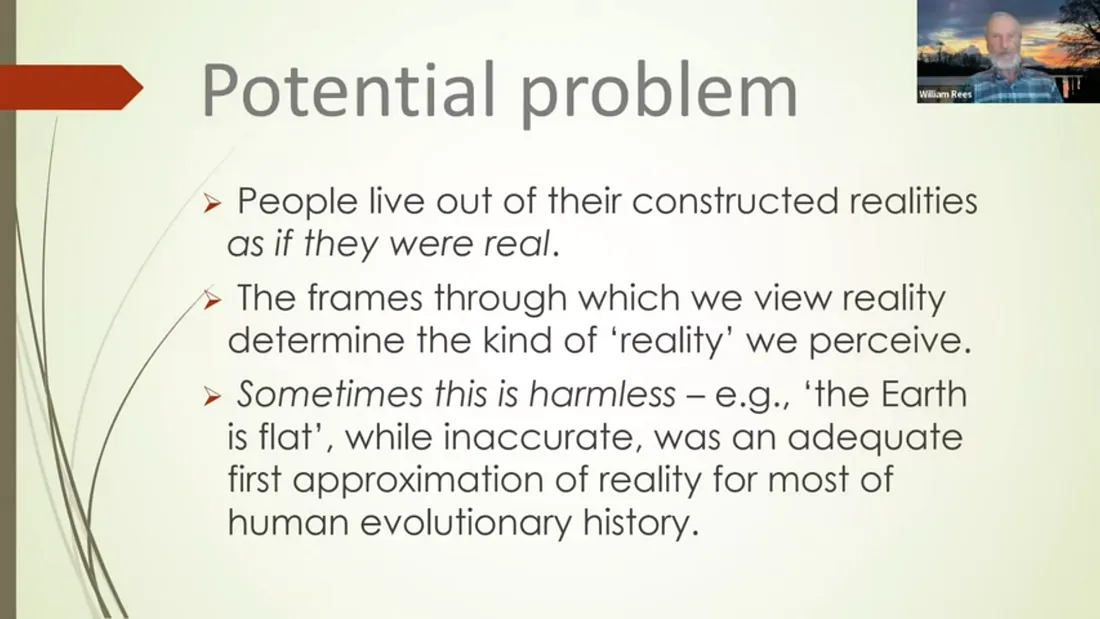
William Rees 12:20
The potential problem is that we still do this, and we tend to live out of our constructed realities as if they were real. I have to credit Ruben Nelson for the next line, but the frames through which we view reality determine the kind of reality we perceive. Most people are unconscious of these simple facts, and sometimes it’s perfectly harmless. "The earth is flat" is a social construct, completely inaccurate, but it was an adequate first approximation of reality, for most of human evolutionary history.

William Rees 12:56
But many of our constructs are not so harmless, and I will just use one example of our prevailing economic narrative. Modern techno industrial cultures, our society globally, is living out of an overly simplistic social construct. It’s a cultural myth called neoliberal economics. As a product of the human mind, neoliberal economics is a simplistic framework, virtually untethered from biophysical reality.
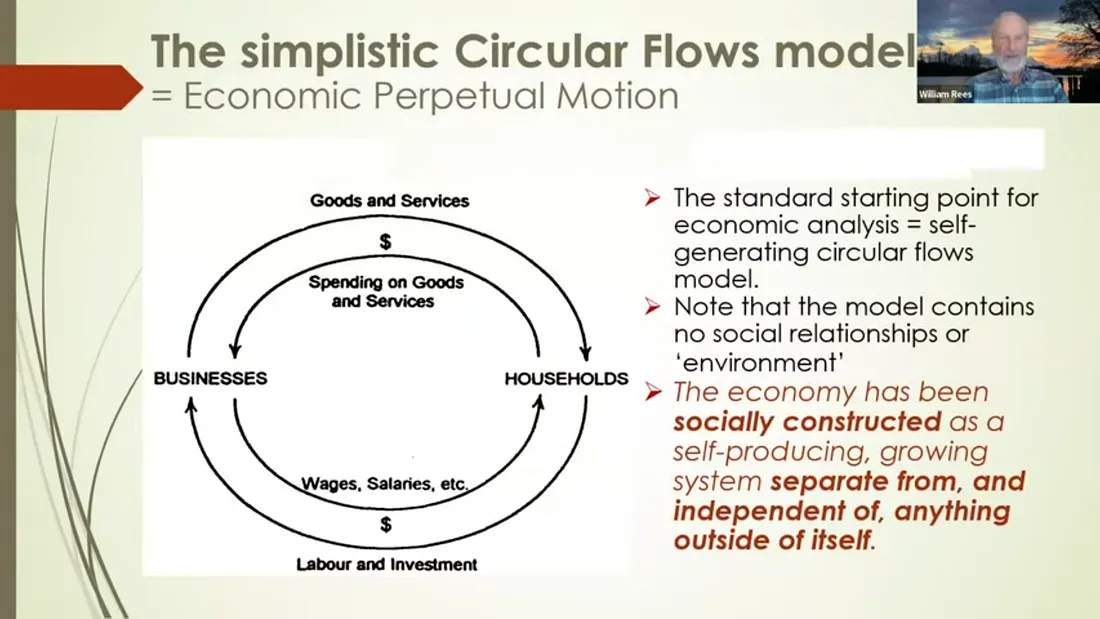
William Rees 13:26
So this is a diagram taken from any standard economics textbook. It gives the so called starting point for economic analysis, the circular flows, or exchange value. It’s a self generating circular flows model and contains really only two entities, businesses and households. There’s no social relationships, and there’s no environment, and we have then socially constructed as the starting point for economic analyzes.
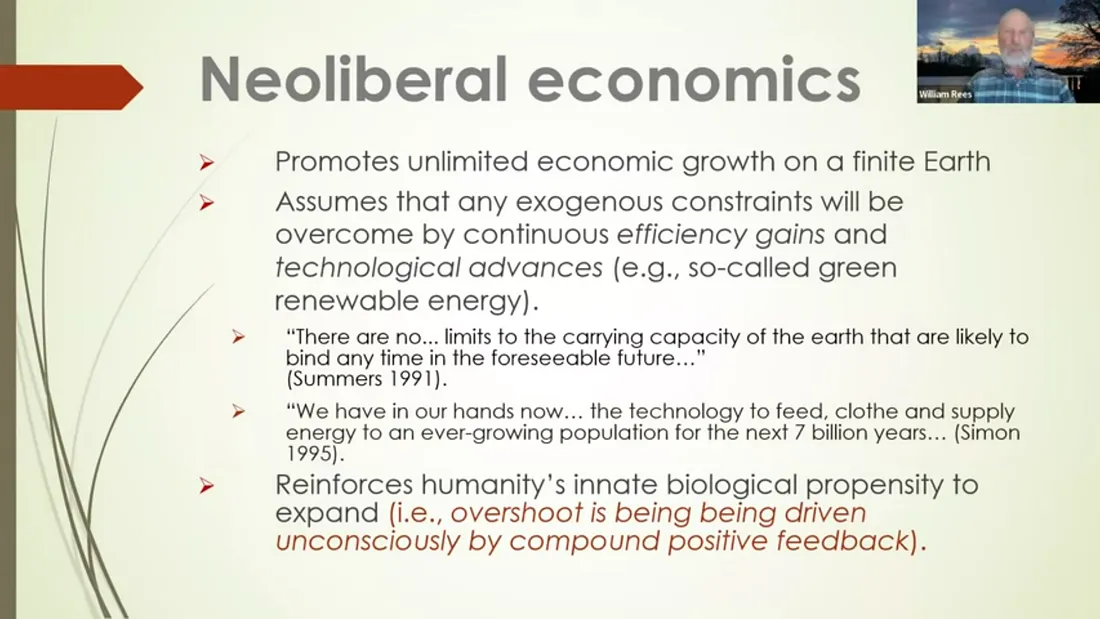
William Rees 13:55
The economy as a self producing, growing system, completely separate from and independent of anything outside of itself. And for those reasons, neoliberal economics promotes unlimited economic growth. If you believe the economy is separate from the environment and that technology can overcome any potential limitations, then there’s no limits to growth. So any exogenous constraints will be overcome by continuous efficiency gains and technological advances.
And just to give a couple of quotes from very prominent economists to support this, Lawrence Summers, at the time, he said, this was the chief economist of the World Bank. Went on to become the president of Harvard University. “There are no limits to the carrying capacity of the earth that are likely to bind at any time in the foreseeable future.” Julian Simon, Professor of Management Studies at the University of Maryland, and famous for such statements as “we have in our hands now the technology to feed, clothe and supply energy to an ever growing population for the next 7 billion years.”
Well, these are social constructs that give people great confidence in human
techno ingenuity and our capacity to just carry on, carrying on, and it
reinforces humanity’s innate biological propensity to expand. Obviously,
all species, have the potential to grow exponentially, but we are unique
in that we’ve developed social paradigms that reinforce this innate
propensity, so that the tendency toward overshoot is being driven
unconsciously by compound positive feedback.
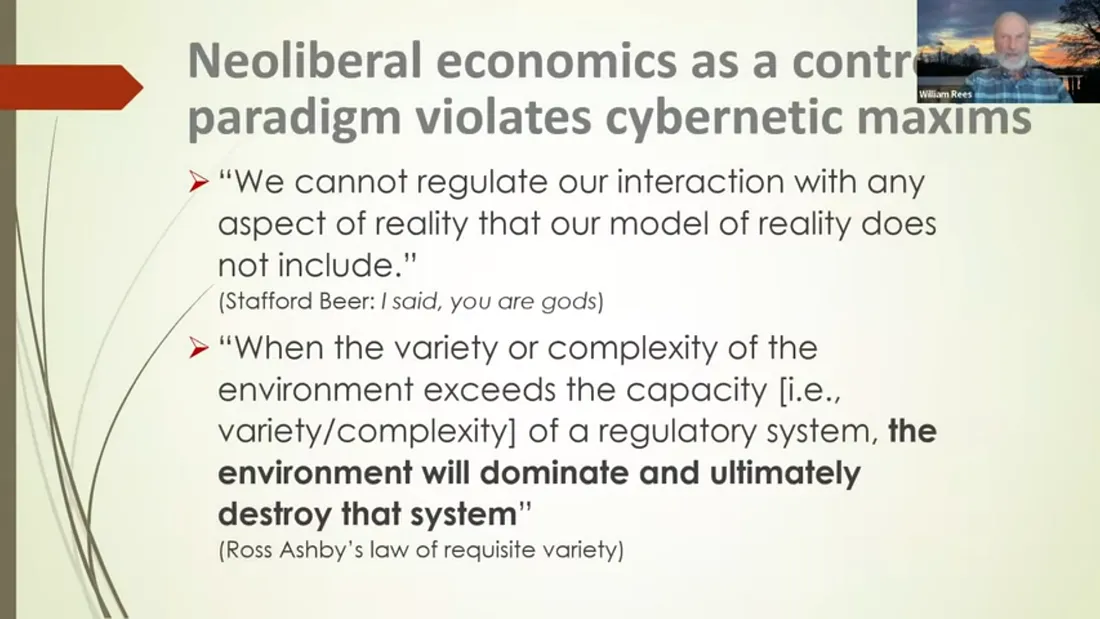
William Rees 15:37
There’s a big problem here. If anyone understands cybernetics, it’s the science of control - systems control. Stafford Beer is a famous cyberneticist. He said, and I think this is a very simple way of putting it, that "we cannot regulate our interaction with any aspect of reality, that our models of reality do not include". So keep the economic models in hand or in mind, rather, that contain no information about the environment, or for that matter, social relationships.
More importantly, meet Ross Ashby, the law of requisite variety. This is a simple version of it, but it really gets the essence of what I’m trying to say here. When the variety or complexity of the environment - think of that as simply the number of possible system states that can exist - When the variety or complexity of the environment exceeds the capacity, - which means the variety or complexity of the regulatory system, the environment will dominate and ultimately destroy that system.
So if your management system doesn’t map well to the complexity of the system you’re trying to manage, you just can’t manage it. And so neoliberal economics fails miserably the test of Ashby’s law. It’s simplistically reductionist. It lacks essential variety. Its basic models contain no useful information about the structure or functional dynamics of the ecological or social systems with which the economy interacts in the real world.
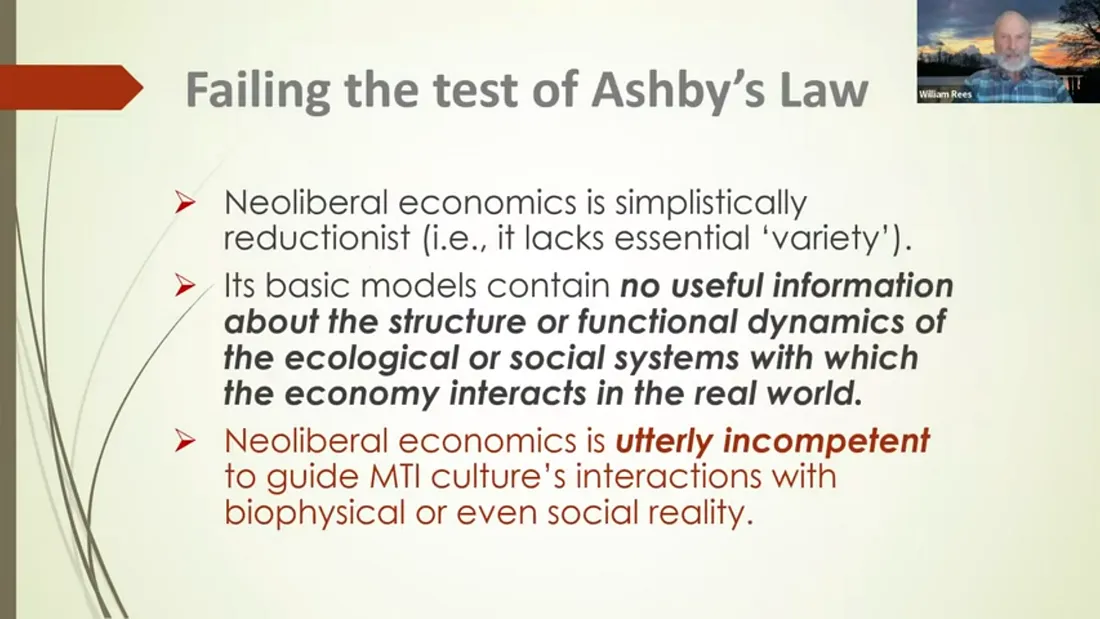
William Rees 17:12
What could possibly go wrong? If neoliberal economics is utterly incompetent, to guide MTI cultures interactions with the biophysical or social realities within which the economy is embedded? So we can add a very simple thing to the circular flows model, and that’s the fact that it’s intimately connected to the environment.
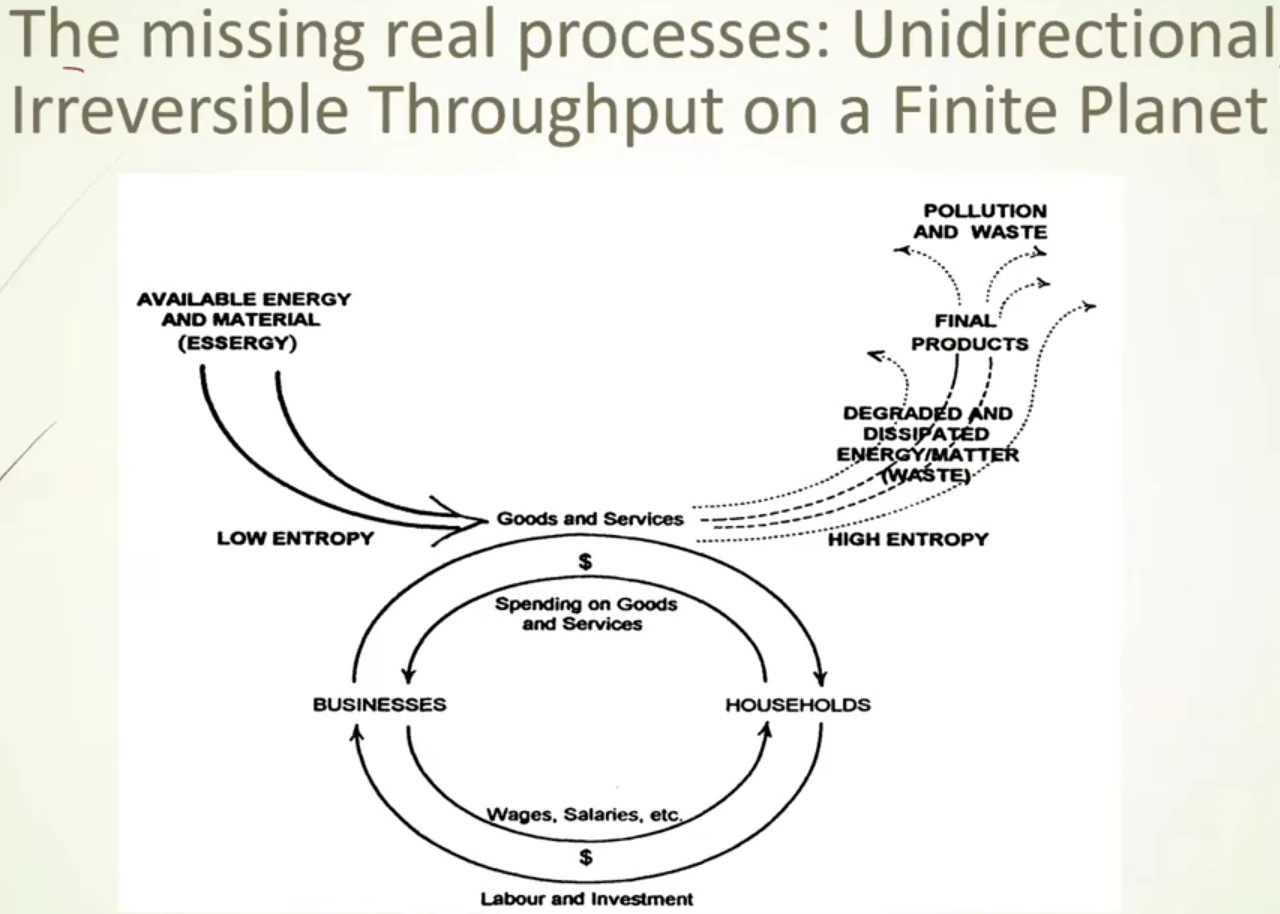
Goods and services are produced by extracting available energy and material from the ecosphere, and 100% of it moves through the system and returns to the ecosphere as pollution and waste, even final products ultimately are degraded and dissipated into the environment.
So the economy is a high entropy creation machine. It takes low entropy, energy and materials and change changes it into high entropy, or disorganized pollution and matter. Another way of looking at this is to recognize - that far from being separate from and independent of the ecosphere, the economy is a growing subsystem, fully contained and utterly dependent on the non growing, finite ecosphere
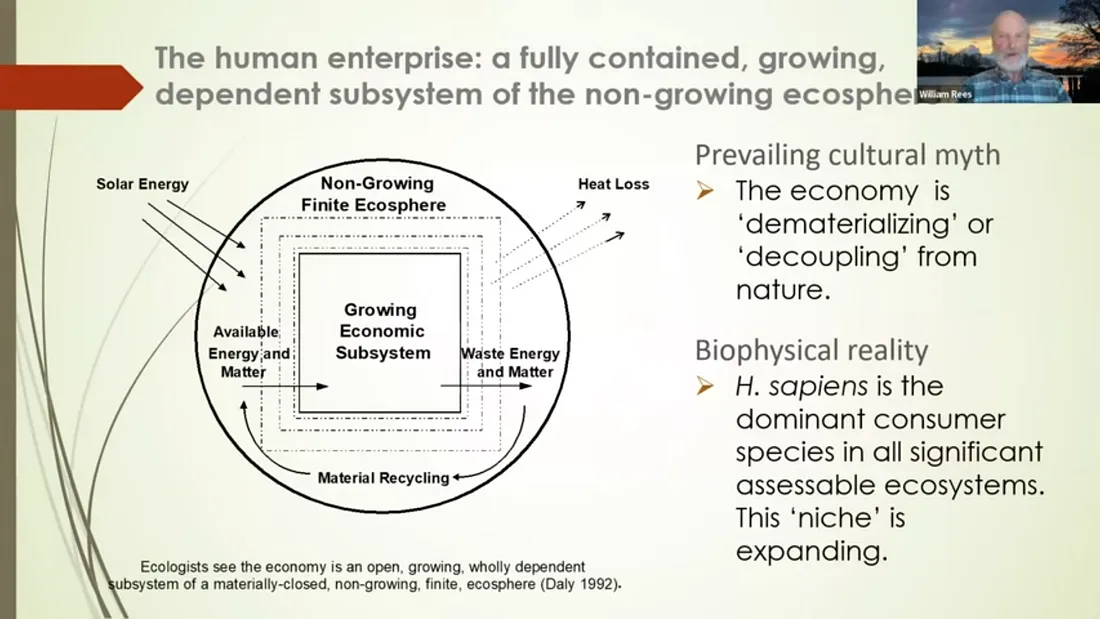
William Rees 18:24
So this is a completely different way of looking at the same relationships. The growing economic subsystem extracts energy and material from the ecosphere, converts it to itself and dumps the waste products back into the ecosphere. And therefore, essentially, human beings are converting the rest of the living planet into human bodies and artifacts as we disintegrate or dissemble the earth.
[ Material Recycling happens all the time with Nature's geochemical cycles and living ecosystems, but hardly at all inside our growing one-way economic subsystem, whose material and energy requirements are far too disappative]
So the prevailing cultural myth, this is another thing economists talk about the decoupling of the economy from the environment, or the dematerialization of the economy, because we tend to use a fewer energy and material resources per unit output. But that’s a relative term. It’s not an absolute concept at all. The fact of the matter is, the reality is that Homo sapiens has become the dominant consumer species in every significant accessible ecosystem on the planet.
We’re not decoupling. We’re expanding our ecological niche by becoming bigger and bigger at the expense of everything else. Humans now constitute, humans, plus our domestic animals, 97% of mammalian biomass on Earth. That’s up from 1% 10,000 years ago, and wild nature has been displaced from 99% to just 3% wild mammals, at any rate.
So to think that we’re decoupling or dematerializing is an absolute mental fabrication that has absolutely nothing to do with the biophysical reality. Now there’s another problem here, and it comes from a. A concept that almost nobody has ever heard of, called autopoiesis, which is the tendency of complex systems to self produce. And I would argue that our culture, our way of thinking that emerges as culture, is an autopoetic system.
End of Part 1 (because even copy, paste, listen and check takes time).
Add Comment
This policy contains information about your privacy. By posting, you are declaring that you understand this policy:
This policy is subject to change at any time and without notice.
These terms and conditions contain rules about posting comments. By submitting a comment, you are declaring that you agree with these rules:
Failure to comply with these rules may result in being banned from submitting further comments.
These terms and conditions are subject to change at any time and without notice.
Comments